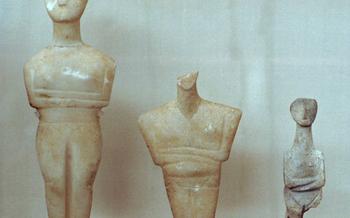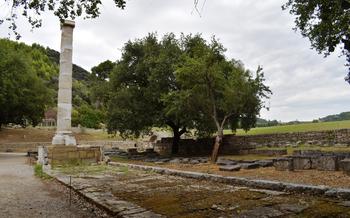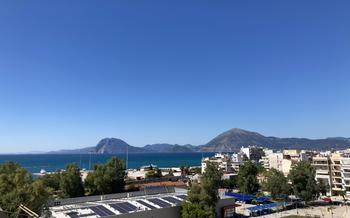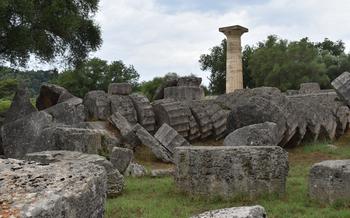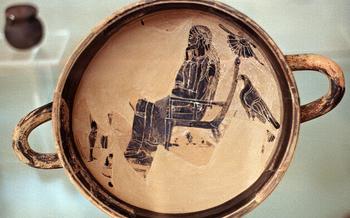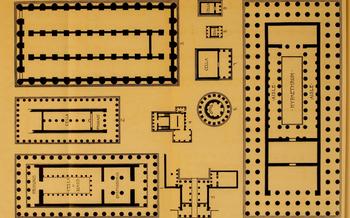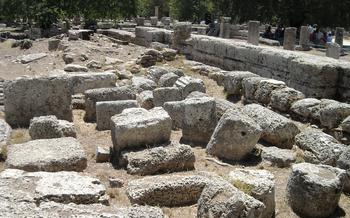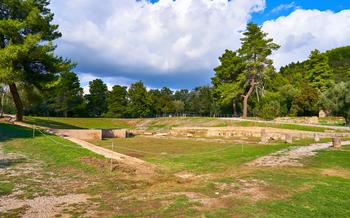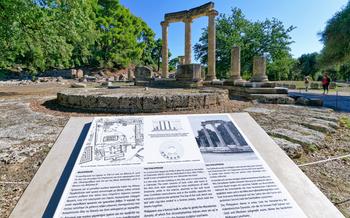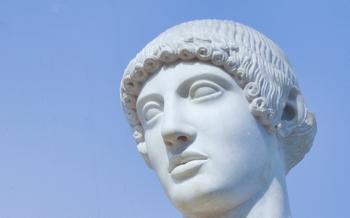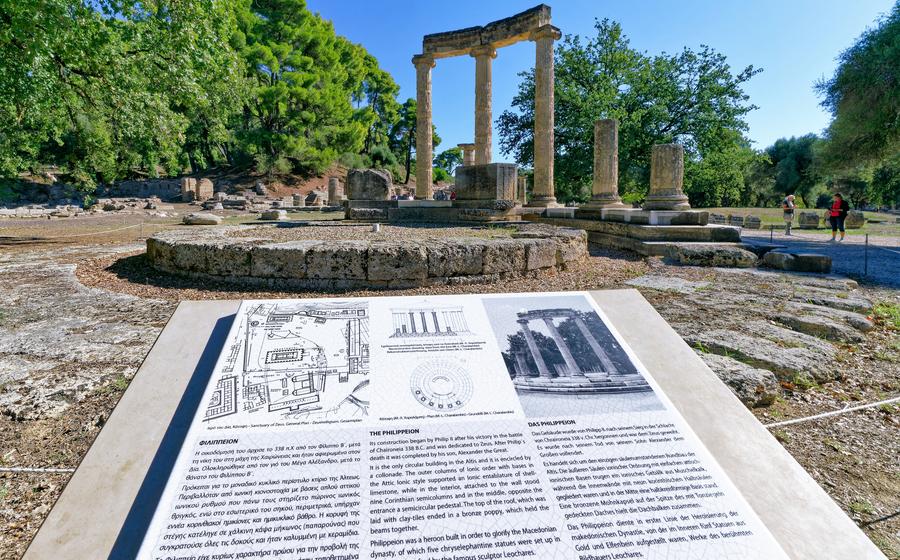
Agios Nikolaos Park
- Agios Nikolaos Park: An Olympian Oasis
- Exploring the Park's Historical Roots
- A Stroll Through Nature's Embrace
- Unveiling the Ancient Stadium
- Witnessing the Echoing Past
- Discovering the Museum's Treasures
- Honoring Zeus, King of the Gods
- Unveiling the Secrets of the Philippeion
- Marveling at the Sculptures
- Stepping into the Past at the Gymnasium
- Relaxing by the Kladeos River
- Savoring Local Delights
- Shopping for Souvenirs
- Insider Tip: Uncrowded Exploration
Agios Nikolaos Park: An Olympian Oasis
Nestled in the heart of Olympia, the birthplace of the Olympic Games, Agios Nikolaos Park beckons travelers with its enchanting blend of history, nature, and tranquility. This verdant paradise, named after the patron saint of Olympia, St. Nicholas, offers a respite from the bustling city center and invites visitors to immerse themselves in the rich heritage and natural beauty of the region.
With its sprawling gardens, ancient ruins, and serene atmosphere, Agios Nikolaos Park is a true gem that showcases the essence of Olympia. Whether you're a history buff, nature enthusiast, or simply seeking a peaceful retreat, this park offers an unforgettable experience that will transport you back in time and leave you spellbound.
Exploring the Park's Historical Roots
Agios Nikolaos Park is not merely a natural oasis but also a site steeped in ancient history and mythology. Its origins can be traced back to the 6th century BC, when it was believed to be a sacred grove dedicated to Zeus, the king of the gods. According to legend, the grove was where Zeus and his brother Hades divided the world between themselves, with Zeus claiming the heavens and Hades taking the underworld.
Archaeological excavations within the park have unearthed remnants of ancient structures, including foundations of temples and altars, suggesting the presence of religious rituals and ceremonies in the area. These discoveries provide a glimpse into the religious beliefs and practices of the ancient Greeks, shedding light on their devotion to the Olympian gods.
Olympia, where Agios Nikolaos Park is located, holds a significant place in Greek history as the site of the ancient Olympic Games, which were held every four years in honor of Zeus. The park is believed to have served as a training ground for athletes and a gathering place for spectators during these prestigious athletic competitions, further emphasizing its connection to the ancient sporting traditions of Greece.
A Stroll Through Nature's Embrace
Agios Nikolaos Park is not just a historical site but also a natural haven, offering visitors a chance to immerse themselves in the beauty of the Greek landscape. The park boasts lush greenery, with a diverse array of flora that adds to its charm. Walking trails and shaded paths meander through the park, inviting visitors to explore its tranquil corners.
As you stroll through the park, you'll be greeted by the sweet fragrance of flowers and the gentle rustling of leaves in the breeze. The park's serene atmosphere provides a welcome respite from the hustle and bustle of everyday life, allowing you to reconnect with nature and find a moment of peace and relaxation.
Whether you're an avid nature lover, a casual walker, or simply seeking a tranquil escape, Agios Nikolaos Park offers a rejuvenating experience amidst its natural wonders.
Unveiling the Ancient Stadium
At the heart of Agios Nikolaos Park lies an ancient stadium that once served as a pivotal stage for athletic competitions and festivities honoring the Olympian gods. Delve into the depths of history as you explore this iconic structure, unraveling tales of its construction, evolution, and the vibrant sporting events that took place within its hallowed grounds.
The ancient stadium, built in the 5th century BC, stands as a testament to the Greeks' passion for sports and their unwavering dedication to the Olympic ideals. Originally designed to host footraces, the stadium gradually expanded to accommodate a variety of athletic disciplines, including wrestling, boxing, and chariot racing. Imagine the roar of the crowd as athletes from across the Hellenic world gathered here to showcase their prowess, striving for glory and the coveted olive wreath that symbolized victory.
Over the centuries, the stadium underwent several modifications and enhancements. In the 4th century BC, a starting line was constructed, and stone seating was added to accommodate the growing number of spectators. The stadium's capacity reached an impressive 45,000, making it one of the largest sporting venues in ancient Greece.
As you wander through the ancient stadium, let your imagination transport you back in time to witness the spectacle of these sporting events. Picture the athletes, clad in traditional tunics, preparing for their moment of glory. Hear the thunderous applause of the crowd as the victors crossed the finish line, their achievements etched into the annals of history.
Witnessing the Echoing Past
The ancient stadium of Olympia holds a unique acoustic phenomenon that has fascinated visitors for centuries. The stadium's elliptical shape and the surrounding hills create an extraordinary echoing effect, allowing sounds to reverberate and carry across the vast space. Legends abound about this remarkable acoustic property, with some claiming that athletes of old could hear the cheers of the crowd even from the farthest corners of the stadium.
Experiments conducted in the stadium have confirmed the exceptional acoustics. A single clap or shout reverberates multiple times, creating a cascading effect that envelops the entire space. This phenomenon is attributed to the stadium's specific dimensions and the surrounding topography, which act as natural amplifiers.
Visitors to the stadium can experience this acoustic wonder firsthand. By standing at the center of the field and clapping or speaking loudly, one can witness the remarkable echoing effect. It is a magical moment that transports visitors back in time, allowing them to imagine the roar of the crowd and the excitement of the ancient athletic competitions.
Discovering the Museum's Treasures
The Archaeological Museum of Olympia is a treasure trove of ancient artifacts that unveil the rich history and cultural heritage of the ancient Olympic Games. Step inside this captivating museum to embark on a journey through time, where you will encounter remarkable relics from the ancient stadium and the wider archaeological site.
Among the highlights of the museum's collection are impressive sculptures, votive offerings, and architectural fragments that once adorned the sacred grounds of Olympia. These artifacts provide valuable insights into the artistic prowess and religious beliefs of the ancient Greeks. Learn about the significance of victory dedications, marvel at the intricate details of bronze statuettes, and discover the stories behind the unearthed treasures.
Don't miss the chance to admire the famous Nike of Paionios, a stunning marble statue that once stood atop a victory monument within the stadium. Its graceful form and intricate drapery capture the essence of athletic triumph. The museum also houses a collection of terracotta figurines, ceramic vessels, and bronze tools that offer a glimpse into the everyday life of ancient Olympia.
Take your time to explore the various galleries and exhibits, each shedding light on different aspects of Olympia's past. From the origins of the Olympic Games to the religious rituals and competitions that took place here, the Archaeological Museum of Olympia offers a comprehensive and captivating experience that will deepen your understanding of this ancient sanctuary.
Honoring Zeus, King of the Gods
Amidst the verdant expanse of Agios Nikolaos Park, a majestic edifice stands tall, radiating an aura of divinity and grandeur. This is the Temple of Zeus, a testament to the power and glory of the king of the gods in ancient Greek mythology. Constructed in the 5th century BC, this Doric-style temple was once one of the largest and most impressive structures in all of Greece.
Its colossal columns, crafted from local limestone, soar towards the heavens, creating a sense of awe and wonder. The pediments, adorned with intricate sculptures depicting the battles of the gods and the labors of Hercules, narrate tales of divine prowess and heroic feats.
Inside the temple, a colossal statue of Zeus, crafted from ivory and gold by the renowned sculptor Phidias, once commanded the sacred space. This awe-inspiring masterpiece, known as the Statue of Zeus at Olympia, was considered one of the Seven Wonders of the Ancient World and drew pilgrims and visitors from far and wide. Though the statue no longer stands, its legacy lives on, inspiring awe and reverence in all who visit this sacred site.
Unveiling the Secrets of the Philippeion
Nestled amidst the lush greenery of Agios Nikolaos Park, the Philippeion stands as a testament to the grandeur of ancient Macedonia. Erected in the 4th century BC, this circular monument was commissioned by King Philip II, father of Alexander the Great, to commemorate his victory at the Battle of Chaeronea.
The Philippeion's architectural design is a testament to the artistry of the ancient Greeks. Its cylindrical form, adorned with 18 Corinthian columns, exudes a sense of elegance and symmetry. The interior chamber once housed a series of statues, including one of Alexander the Great himself, crafted from gold and ivory.
The sculptures that once adorned the Philippeion are now housed in the Archaeological Museum of Olympia, where visitors can admire their intricate details and expressive forms. These masterpieces depict scenes from Alexander's life and conquests, offering a glimpse into the grandeur of the Macedonian era.
Exploring the Philippeion is like stepping back in time, allowing visitors to imagine the splendor of ancient Macedonia and the legacy of Alexander the Great. Its well-preserved ruins and evocative sculptures transport visitors to a bygone era, making it a must-see attraction within Agios Nikolaos Park.
Marveling at the Sculptures
Adorning the verdant expanse of Agios Nikolaos Park, an array of remarkable sculptures beckons art enthusiasts and history buffs alike. Among these treasures, the Hermes of Praxiteles stands as a masterpiece of ancient Greek artistry. Crafted from gleaming white marble, this life-size statue portrays the messenger god Hermes cradling the infant Dionysus in his arms. The intricate details and lifelike expressions of the figures exude a sense of divine grace and serenity.
Other notable sculptures within the park include the Nike of Paionios, a winged goddess of victory, and the Lysippos' Apoxyomenos, depicting a young athlete scraping oil from his body after a strenuous workout. These masterpieces, along with numerous other statues and busts, provide a glimpse into the artistic prowess and cultural heritage of ancient Greece.
As you wander through the park, take a moment to admire the Dancing Satyr, a bronze statue capturing the exuberance and energy of the mythical creatures. The Satyr with the Infant Dionysus and the Pan and Apollo are further examples of the park's rich sculptural collection. Each work of art tells a story, offering insights into Greek mythology, religious beliefs, and artistic traditions.
Whether you're an art connoisseur or simply appreciate beauty, the sculptures of Agios Nikolaos Park are sure to leave a lasting impression. These timeless masterpieces, nestled amidst the tranquil surroundings of the park, create a harmonious blend of nature and art that is truly captivating.
Stepping into the Past at the Gymnasium
Nestled amidst the lush greenery of Agios Nikolaos Park lies the ancient Gymnasium, a remarkable testament to the athletic prowess and training practices of Olympia's past. This significant structure served as a training ground for athletes preparing for the prestigious Olympic Games, held every four years in honor of Zeus, the king of the gods.
Step into the Gymnasium and be transported back in time as you envision the rigorous training regimens undertaken by ancient athletes. Picture them honing their skills in wrestling, running, and other athletic disciplines, driven by a spirit of competition and a desire to achieve glory. The Gymnasium's well-preserved remains offer a glimpse into the ancient Olympic tradition of physical excellence and the pursuit of athletic perfection.
Explore the various facilities within the Gymnasium, including the palaestra, where wrestlers grappled on sandy grounds, and the apodyterium, where athletes changed and prepared for their training sessions. Admire the architectural features of the Gymnasium, such as the rows of columns that once supported the roof, providing shelter from the elements.
As you wander through the Gymnasium, let your imagination soar, picturing the determination and camaraderie that filled these spaces during ancient times. Feel the energy of the athletes as they pushed their limits, striving to achieve greatness and earn the honor of representing their city-states at the Olympic Games. The Gymnasium stands as a testament to the enduring legacy of the ancient Olympic spirit, where physical prowess and athletic excellence were celebrated and revered.
Relaxing by the Kladeos River
The Kladeos River, with its gentle flow and crystal-clear waters, adds to the charm of Agios Nikolaos Park. Take a leisurely stroll along its banks, enjoying the serene views and the soothing sounds of nature. Find a shady spot beneath the trees and spread out a blanket for a delightful picnic. Indulge in local delicacies while immersing yourself in the beauty of the surroundings. The river offers a tranquil retreat, where you can escape the hustle and bustle of the city and reconnect with nature. Whether you choose to bask in the sun, read a book, or simply relax and listen to the gentle lapping of the water, the Kladeos River promises a rejuvenating experience that will leave you feeling refreshed and revitalized.
Savoring Local Delights
After a day of exploring the historical wonders of Agios Nikolaos Park, indulge in the culinary delights that Olympia has to offer. The town boasts a variety of restaurants and cafes, many of which are located within walking distance of the park.
Savor the authentic flavors of traditional Greek cuisine, with dishes such as succulent grilled meats, fresh seafood, and mouthwatering pastries. Sample the local specialties, including the famous Olympia salad, made with fresh tomatoes, cucumbers, and feta cheese.
As you enjoy your meal, take in the vibrant atmosphere of the town. The restaurants and cafes are often lively and bustling, with locals and tourists alike enjoying the delicious food and lively conversation.
Whether you're looking for a quick bite or a leisurely dining experience, Olympia has something to offer every palate. So, after a day of exploring the ancient ruins and natural beauty of Agios Nikolaos Park, be sure to treat your taste buds to the culinary delights of this charming town.
Shopping for Souvenirs
As you stroll through the charming streets near Agios Nikolaos Park, you'll stumble upon a treasure trove of local shops and markets waiting to be explored. These vibrant spaces showcase a diverse array of unique handicrafts and souvenirs that will serve as lasting mementos of your visit to Olympia.
From intricate pottery adorned with traditional Greek motifs to handwoven textiles in vibrant colors, these shops offer a glimpse into the region's rich cultural heritage. You'll find an abundance of olive wood carvings, each piece a testament to the skill and artistry of local craftsmen.
For those seeking a taste of the region's culinary delights, there are specialty shops offering locally produced olive oil, honey, and herbs, each infused with the essence of the Greek countryside. These culinary treasures are not only delicious but also make thoughtful gifts for friends and family back home.
As you browse through the myriad of souvenirs, you'll discover a piece of Greece to take with you, whether it's a handmade ceramic plate depicting ancient scenes or a delicate piece of jewelry inspired by Greek mythology. Each item carries a story, a reminder of the beauty and history you've experienced in Olympia.
So, as you prepare to bid farewell to Agios Nikolaos Park, take some time to explore the local markets and shops. Immerse yourself in the local culture, indulge in unique finds, and create lasting memories through the souvenirs you choose to cherish.
Insider Tip: Uncrowded Exploration
To truly immerse yourself in the tranquility of Agios Nikolaos Park, consider visiting during the early hours of the morning or the late afternoon. These times offer a serene atmosphere, free from the crowds that may gather during the peak tourist season. You'll have the opportunity to wander through the park's paths, admire the ancient ruins, and soak in the natural beauty without distractions. Embrace the solitude and experience the park's magic in a unique and personal way.
